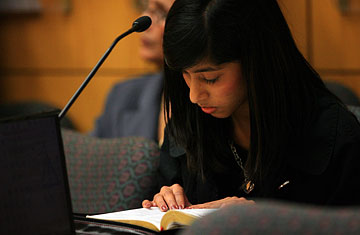
Rifqa Bary, 17, reads a Bible during her court proceedings in Orlando, Fla., on Aug. 21, 2009
(2 of 2)
If Rifqa's claims are indeed false, that raises the question of whether she may have been prodded by her new friends at Global Revolution Church to make the death-threat accusations, and whether she was somehow lured to Orlando by the Lorenzes via the Internet. The couple, who could not be reached for comment, have denied it to the media. But Beverly Lorenz has acknowledged that she talked by phone with Rifqa before the girl ran away. Blake Lorenz, who insists that Rifqa will be killed if she goes home, earlier this month made clear to reporters his Crusades-era belief that this is part of Christianity's holy struggle against Islam: "These are the last days; these are the end times," he said, "and this conflict between Islam and Christianity is going to grow greater. This conflict between good and evil is going to grow greater."
As a result, says McCarthy, "you wonder if people have been stoking this fear in her head, telling her, 'This is what the Koran says will happen to you.' " The Orlando lawyer who claims to represent Rifqa, conservative activist John Stemberger, head of the Florida Family Policy Council (which fought in 2005 to keep Terri Schiavo on life support), last week wrote in a petition to keep the girl in Florida that she "is in imminent threat of harm from the extreme radical Muslim community in her hometown of Columbus." He warned that one of the world's largest "cells of al-Qaeda operatives" once worked from a Columbus mosque the Barys have attended. He bases these sweeping claims on the fact that Salah Sultan, a controversial Islamic scholar who denies that Arab terrorists committed the 9/11 attacks, once had ties to the city's Muslim community. Stemberger tells TIME he plans to introduce more specific evidence in the coming days. "There are many peaceful, law-abiding Muslims in this country, and they should be embraced, so this is not about Christianity vs. Islam," says Stemberger. "It's about what's in the best interests of Rifqa Bary, whether the threat to her in this particular community is real and she could end up disappearing in the night there. Normally I would be an advocate for parental rights, but not in this case."
After its probe of the situation this month, Florida's Department of Children and Family Services took Rifqa from the Lorenzes and placed her in foster care. At a hearing in Orlando on Aug. 21, a judge ruled that she could remain in Florida until he decides, probably at a later hearing slated for Sept. 3, where she should ultimately go. (McCarthy says the Barys were willing to let Rifqa be placed in Ohio foster care while the case is adjudicated.)
Not surprisingly, Rifqa is turning into a cause célèbre. Conservative websites often accused of anti-Muslim agendas, such as the Jawa Report, Atlas Shrugs and WorldNetDaily, have been lighting up over the Rifqa fight. No doubt conservative and anti-U.S. Muslims will eventually step into the media frenzy. And politicians have already started weighing in. Florida's moderate Republican governor and U.S. Senate candidate, Charlie Crist, who needs conservative voters to win his state's closed GOP primary next year, issued a statement on Aug. 21 saying he's "grateful to Circuit Judge Daniel Dawson for his decision to grant [Rifqa] the right to remain in Florida ... We will continue to fight to protect Rifqa's safety and well-being as we move forward." Of course, Crist's conservative primary opponent, former Florida house speaker Marco Rubio, released his own communiqué: "Florida not only has a responsibility to protect [Rifqa's] innocent life, but also to defend her sacred right to worship freely." True enough. But despite the heated rhetoric once again fueling a Florida fracas, it's not at all clear that Rifqa Bary's rights are in danger.
